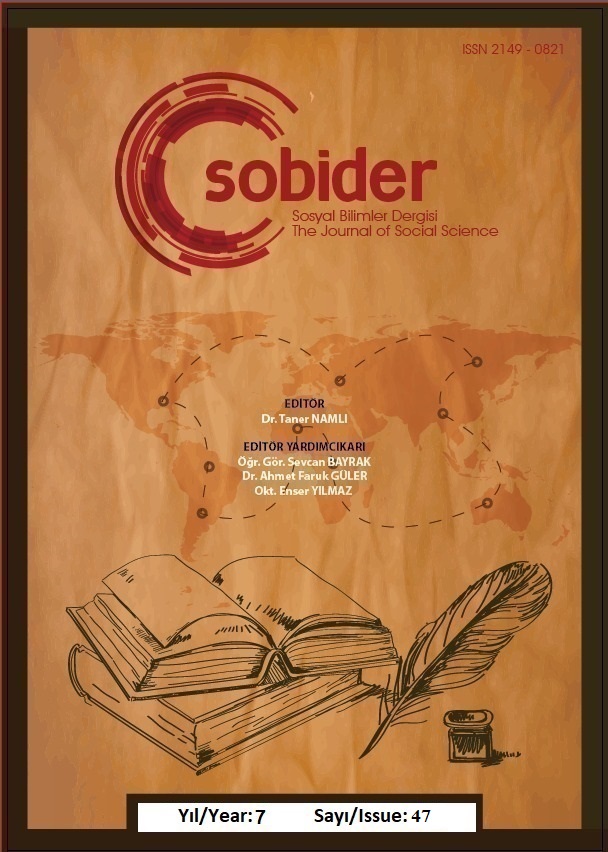Author :
Abstract
1980’li yıllarda gelişmekte olan ülke ekonomilerinin finansal sistemleri baskıdan kurtulup serbest piyasa şartlarına geçiş yapmaya başlamıştır. Finansal baskı ve ekobomik büyüme arasındaki ilişkiyi inceleyen öncül çalışmalar geçiş sürecinin pozitif etkilerinin olduğunu iddia etmiştir. Böylece, finansal baskının ekonomi üzerinde doğrudan ve dolaylı olarak negative sonuçlarının olduğu söylenebilir. Bu durum, özellikle küresel finans krizinden sonra, bir başka küresel finans krizinin başlamaması için finansal baskının gerekliliği iktisatçılar tarafından tartışılmaya başlanmıştır. Bu çalışmada, Türkiye ekonomisinin büyüme performansında finansal sistemdeki baskının rolü incelenmektedir. Baskıcı politikalar ile ekonomik büyüme arasındaki ilişkinin muhtemel varlığı 2008 ve 2020 yılları arasında gelişmiş zaman serisi analiz metotları ile incelenmektedir.
Keywords
Abstract
In 1980s, developing economies had started to transform financial systems from repressive form to open market form. It is clear that initial studies related to interaction between financial repression and economic growth claim positive effect of the transition process. So, consequences of financial repression are likely to negative on economy directly and indirectly. This is especially for emerging market economies. After the global financial crisis, the discussion on necessity of financial repression against another global finance crisis has begun among economists. In this study, role of repression on financial system in growth performance of the Turkish economy is discussed. A possible presence of relation between repressive policies and economic growth in the period between years 2008 and 2020 is analyzed via advanced times series analysis methods.
Keywords
- Breitung, J. and Candelon, B. (2006). Testing for Short and Long-Run Causality: A Frequency Domain Approach. Journal of Econometrics, 132, 363-378.
- Demetriades, P. O., & Luintel, K. B. (2001). Financial restraints in the South Korean miracle, Journal of Development Economics, 64, 459–479.
- Dickey, D. Wayne F. (1981). Likelihood Ratio Statistics For Autoregressive Time Series With A Unit Root. Econometrica, 49, 1057-72.
- Doğan, T. (2019). 2008 Küresel Finans Krizinin Gelişmekte Olan Ülkelere Etkileri: Teori ve Uygulama. Erciyes Üniversitesi Sosyal Bilimler Enstitüsü, Yayınlanmamış Yüksek Lisans Tezi. Kayseri.
- Ergür, H., Özek, Y. (2020). Kırılgan Beşli Ülkelerinde İhracata ve İthalata Dayalı Büyüme: Ampirik Bir Değerlendirme. Uluslararası Ticaret ve Ekonomi Araştırmaları Dergisi, 4 (1), 32-46.
- Etibar J., Rodolfo M. and Marco P. (2019). Financial Repression is Knocking at the Door, Again. Should We Be Concerned?, IMF Working Paper.
- Fry, M. (1989), “Financial Development: Theories and Recent Experience”, Oxford Review of Economic Policy, Vol. 5, No. 4, pp. 13–28.
- Ghali, Khalifa (1999). Financial Development and Economic Growth: The Tynisian Experience. Review of Development Economics, Vol. 3, No. 3, pp. 310–322.
- Gitau, GK., and Kosimbei, G. (2015). Kenya'da Finansal Baskının Ekonomik Büyüme Üzerindeki Etkileri. Uluslararası İşletme ve Ticaret Dergisi, 5 (2), 15-37.
- Hatemi-J and Roca, E. 2014. Brics And PIGS In The Presence Of Uncle Sam And Big Brothers: Who Drive Who? Evidence Based On Asymmetric Causality Tests, Griffith Business School Discussion Papers Finance, ISSSN:1836-8123
- Loayza, N. and Ranciere, R. (2006), Financial Development, Financial Fragility, and Growth, Journal of Money, Credit and Banking, 38, (4), 1051-1076.
- McKinnon, R. (1973). Money and Capital in Economic Development. Brookings Institution, pp.
- McKinnon, R. (1991). The Order of Economic Liberalization: Financial Control in the Transition to a Market Economy, Johns Hopkins University Press, Baltimore.
- Mete F. and Omid D. N. (2013). Financial development under financial repression: the case of Iran, Investment Management and Financial Innovations, 10 (1-1).
- Özek, Y. (2020). Effect of Financial Pressure on Economic Growth in Turkey: Evidence from Symmetric and Asymmetric Regression. Journal of International Management Educational and Economics Perspectives, 8 (1), 61-70.
- Roubini N. ve Sala-i-Martin (1992), Financial repression and economic growth, Journal of Development Economics, 39: 5-30.
- Shaw, E.S. (1973). Financial Deepening in Economic Development. New York: Oxford University Press.
- Stiglitz (1993). The Role of the State in Financial Markets. The World Bank Economic Review7 (Suppl. 1): 19–52.
- Xu, G. and Gui, B. (2019). From financial repression to financial crisis? The case of China. Asia Pac Econ Lit., 33: 48-63.
- Uygur, E. (2001). Krizden Krize Türkiye: 2000 Kasım ve 2001 Şubat Krizleri. (No. 2001/1). Discussion Paper.
- Whalen, R. (2019). The Financial Repression Index: U.S Banking System Since 1984, Draft Working Paper.
- Williamson, J. (1998). Whither Financial Liberalization?. In Keynote Address Delivered at the Second Annual Indian Derivatives Conference, Mumbai, India (Vol. 12).
